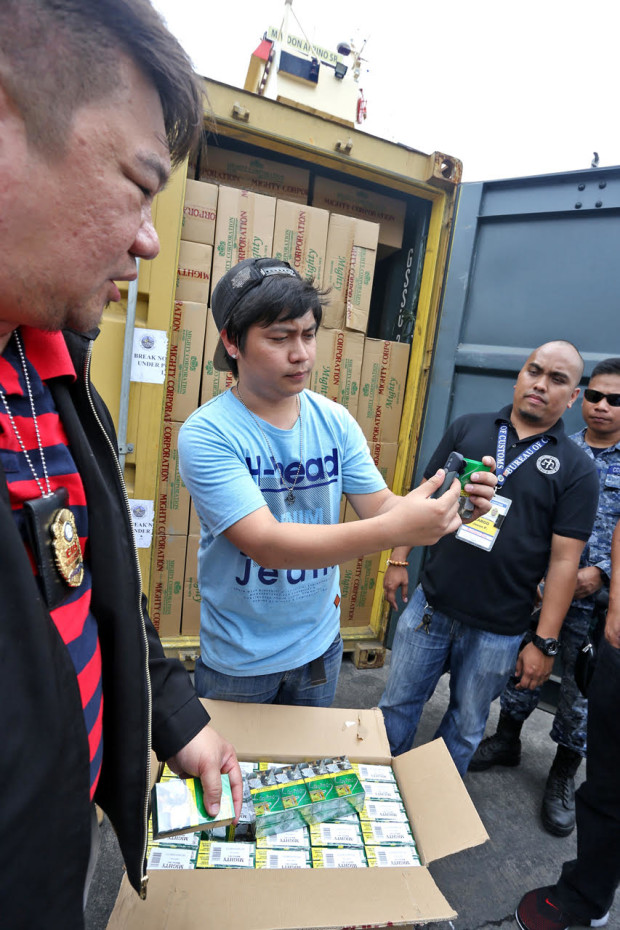
Neil Estrella (left) CIIS director of the Bureau of Customs watches as a BIR employee uses a taggant reader to the alledge smuggled Mighty cigarettes pack to confirm that the stamps were fake after it was sized in two. 20 footer container vans at pier 4. (JUNJIE MENDOZA)
The state-run printer that churns out the tax stamps being affixed to cigarette packs said on Thursday that it had nothing to do with the proliferation of fakes that was depriving the government of billions of pesos in foregone revenue.
APO Production Unit Inc. chair Mike Dalumpines said allegations that security was lax in the high-security printing plant was “baseless.” APO is an attached agency of the Presidential Communications Operations Office (PCOO).
Dalumpines was referring to a Bureau of Internal Revenue (BIR) report in December, which, he said, was “also incorrect.”
Task force investigation
The BIR progress report on the investigation of a task force looking into APO’s alleged overprinting of the internal revenue stamps being affixed to cigarette packs pointed to lapses in ensuring no fraudulent activity in the tax stamp production.
The report, dated last Dec. 19, noted that while stamp production was done 24 hours a day, seven days a week, the task force found that a full-time revenue officer on the premises was present only during office hours.
Also, it said a “significant number” of stamps were eventually declared “defected” [defective] by APO, but internal control measures were lacking to determine where these defective stamps went, the report said.
From 2014 to 2016, a total of over 13.5 million stamps were declared “defected,” although further investigation showed that the actual number could climb to 37.4 million, according to the report.
‘Bad orders’
There were also so-called “bad orders” that cigarette manufacturers returned but still kept within APO premises.
In its investigation of the proliferation of fake stamps, the task force found that “several QR codes found in the fake stamps were observed to be regenerated or, in layman’s term, reused multiple times.”
A QR code is a two-dimensional barcode containing a unique identifier code printed on the tax stamp pertinent to the single cigarette pack bearing the stamp. Hence, a tax stamp ideally bears a unique QR code.
Regenerated codes
According to the report, “the QR codes that were regenerated multiple times were traced or belongs to only one company, Mighty Corp.”
The task force also found that Asa Color Trading Corp., which supplies the silver ink being used by APO in the tax stamps’ silver strip, also supplied Mighty’s ink.
Also, United Graphic Expression Corp., which is the contract supplier of base printing of tax stamps to APO, is also Mighty’s supplier.
In February, Presidential Communications Secretary Martin Andanar said he had instructed APO “to help the BIR in its investigation” of Mighty as well as other cigarette firms that allegedly use fake tax stamps.